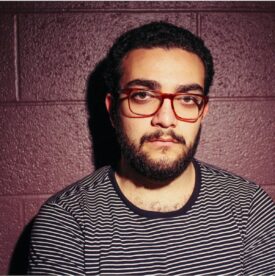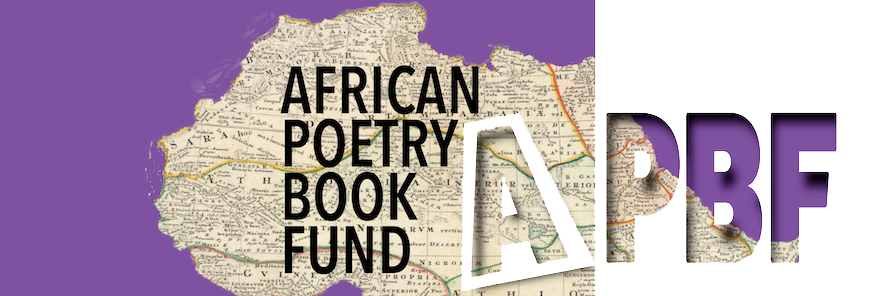Chapbook Chats: Tryphena Yeboah Interviews “At the Gates” Author Hazem Fahmy
To celebrate the launch of the latest in the New-Generation African Poets Chapbook Box Set series, Tisa, Tryphena Yeboah, is talking to poets whose chapbooks are included in New-Generation African Poets: A Chapbook Box Set (Tisa). This series continues with a conversation between Tryphena and poet Hazem Fahmy. The interview was conducted via email and has been lightly edited for publication.
Tryphena Yeboah: Congratulations on being selected as part of the 2023 New-Generation African Poets series! What a wonderful time for you, and a tremendous contribution to the growing body of African poetry in the world. What are your thoughts and feelings about this news?

Hazem Fahmy: Thank you! It’s certainly an honor, and also quite humbling. I was first invited to submit in 2017, when I was finishing up a kind of capstone poetry project in the last year of my BA. I ended up submitting a different manuscript for APBF’s consideration, which was not accepted, and over the years thought I would abandon both. That capstone was the first draft of what ultimately became At the Gates, and that other manuscript became my previous chapbook, Waiting for Frank Ocean in Cairo (Half-Mystic Press, 2022). A blessing!
TY: Music is such a prominent element in your poems, and you use lyrics from and names of Egyptian and Arabophone songs. What are some of your earliest memories of music and how would you describe the relevance of sound in your work?
HF: To be perfectly honest, I am in a very different place when it comes to the relationship between music and poetry now than when I was when I was writing and revising these poems. Namely, I was, like a lot of diasporic writers in the US today, going through a melancholic nostalgia for an “authentic” cultural space whose fiction I am no longer invested in maintaining. This isn’t to say I didn’t love those songs! I did and very much still do. But it is to say that their incorporation came out of an anxious place that I no longer seek to inhabit, one that felt compelled to “defend” claims to various identities as political ends in and of themselves. Music will absolutely return to my work in the future, but I am still figuring out what that will look like.
TY: There is a powerful force in how you employ language on the page, particularly your decision to lace the poems with Arabic words and phrases. What would you say are the possibilities of writing in multiple languages? And I’m also curious if different emotions inhabit each language?
HF: In a similar vein to that of music, my relationship to language, and more specifically the use of Arabic in my Anglophone poetry, was one of anxiety and crisis. I felt insecure that I had, in a sense, “found” myself creatively in English more than in Arabic and the entry of the latter into the former in my personal case was a way of coping with that while avoiding an honest reckoning with the socioeconomic factors that led to my presence and education in the United States. Again, I have by no means sworn off the use of Arabic in my Anglophone writing, and I certainly do not apply this lens to the hybrid poetry of others, but it is nevertheless a move I am currently keeping a distance from until, as the parlance goes, one figures out what is going on. In lieu of that, I have started much more seriously dedicating time to writing in Arabic and since doing so have found that the language does not seek to enter the English as much.
TY: As a selectee for this year’s new generation series, you have become part of the APBF African poets “family.” What does it mean to be part of a growing body of contemporary poets emerging from the continent? What does being an African poet mean to you?
HF: The radical legacy of Pan-Africanism is not done for, not by a longshot. Despite the best efforts of neocolonial powers and their comprador allies, resistance to imperialism, as well as a genuine desire for collaboration and exchange, abounds across the continent. While I am heavily invested in continental solidarity for its own ends, it is particularly crucial to me as an Egyptian given how reactionary chauvinists continue to insist that our country is, somehow, separate from its neighbors. I find it heartbreaking, but also deeply dangerous, that there seems to be more and more of a sincere belief in my generation in the mutual exclusivity of Arab and African transnational solidarity and politico-cultural alliances. Nothing would suit imperialism more than the reification of fictive borders. While I have no illusions that these challenges can be overcome with literary output alone, I hope that my own and fellow young Africans’ writing can, at the very least, insist upon remembering what we stand to gain from an Africa uninvested in borders.
While I am heavily invested in continental solidarity for its own ends, it is particularly crucial to me as an Egyptian given how reactionary chauvinists continue to insist that our country is, somehow, separate from its neighbors.
Hazem Fahmy
TY: Your third chapbook is out in the world and I hope this is not too daunting of a question to ask, but I’m eager to hear what projects you’re currently working on and if you have any exciting works in the pipeline?
HF: I do! I am currently putting together what I hope will be my first full-length manuscript, tentatively titled Frontier Redux. I’ve been working on it for about five years now, and it revolves around the everyday illusions that sustain our colonial order. I have also been much more drawn to the poetics of the quotidian so there’s a lot there about sandwiches as well.
Hazem Fahmy is a writer and critic from Cairo. His poetry has appeared, or is forthcoming in The Best American Poetry 2020, AAWW, The Boston Review, and Prairie Schooner. His criticism has appeared, or is forthcoming, in The Los Angeles Review of Books, Mubi Notebook, Reverse Shot, and Mizna. He runs the newsletter wust el-balad on Substack.
Tryphena Yeboah is a Ghanaian writer and the author of the poetry chapbook, A Mouthful of Home, selected by the New Generation African Poets Series. Her fiction and essays have appeared in Narrative Magazine, Commonwealth Writers, and Lit Hub, among others. She is currently a Ph.D. student at the University of Nebraska-Lincoln, studying English with an emphasis in Creative Writing.
